Counting the Days of Amazon and Blue Origin
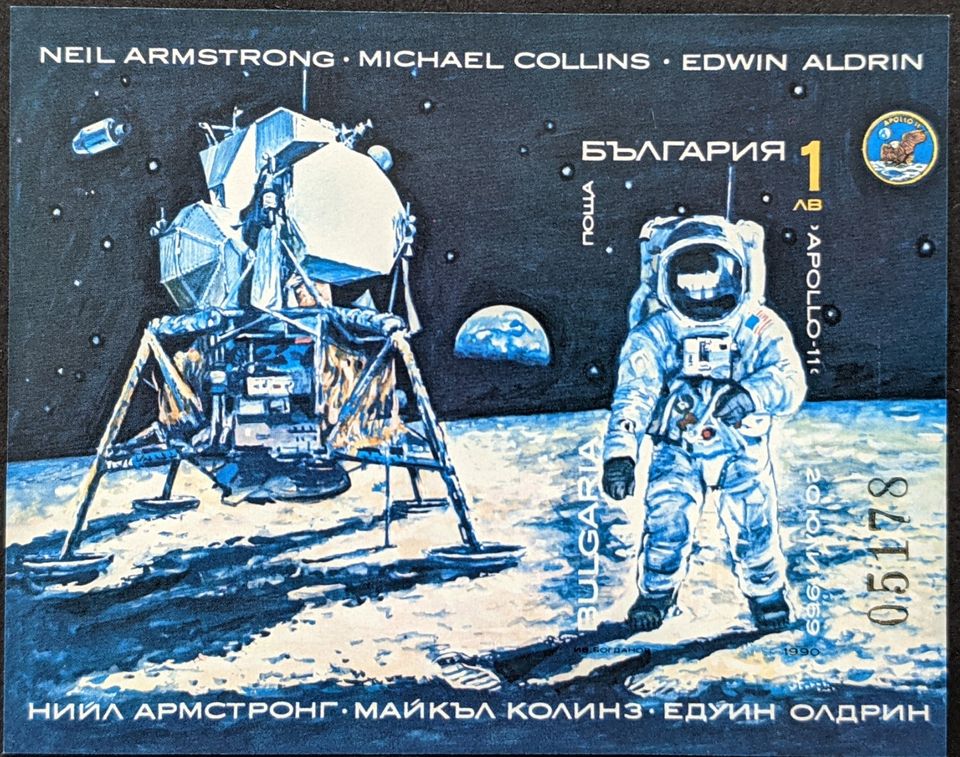
Just one quick announcement: for those attending the Space Symposium in Colorado Springs, you might have received a free edition of The Space Report. You’ll find my work, “A Growing Ecosystem: The SmallSat Economy,” within on page 29. It’s good information about the goings-on during the past decade or so in the smallsat sector. It provides a few observations of how leveraging the changes in that sector can help new operators seeking to jump in.
On to the analysis!
Blue Origin isn’t Amazon
Sure, this is obvious. Amazon delivers most of everything a person wants to their doorstep. Blue Origin launches reusable suborbital rockets. But the intent here is to compare Amazon’s culture and values to Blue Origin’s. After all, both have the same founder, Jeff Bezos, and he pushed the importance of a particular culture at Amazon. Is the apparent lack of a nearly opposite culture at Blue Origin a reason for resorting to erecting legal obstacles? It’s a bit difficult to say, as Blue Origin is secretive.
Reading stories of Blue Origin’s latest legal antics in its tantrum-based contract acquisitions strategy for NASA’s Human Landing System (HLS) highlights just how different Blue Origin is from its founder’s other company, Amazon. For example, would Amazon ever have created such an ill-conceived infographic as this one from Blue Origin (below)?
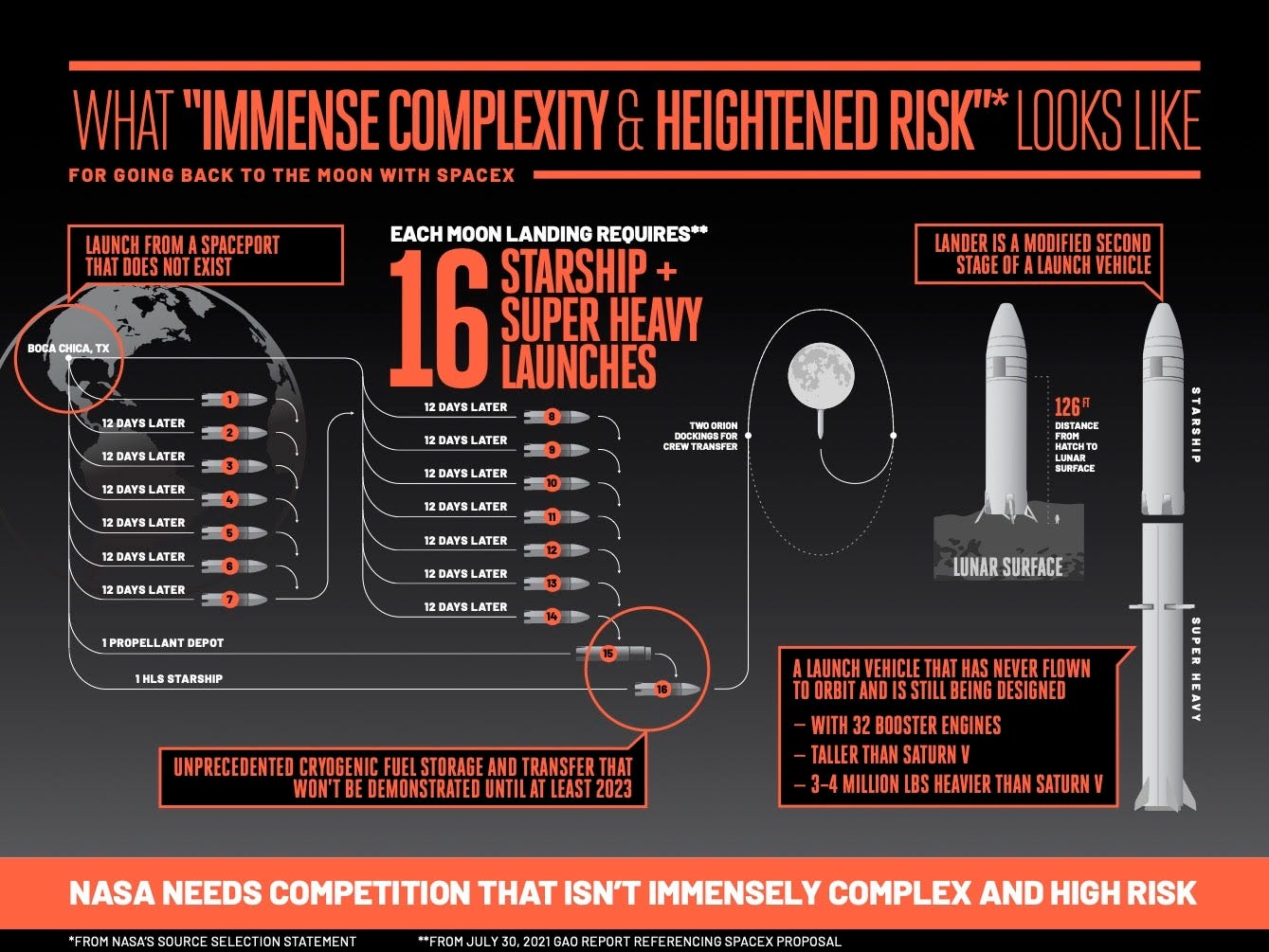
Maybe not?
As some Reddit users (and users in other forums) indicate, the infographic doesn’t convey the intended message. The references to undemonstrated SpaceX capabilities and rockets that haven’t flown underscore Blue Origin’s dearth of the same by “an order of magnitude.” Blue Origin has yet to test launch its first orbital launch system, much less demonstrate that system’s reusability. But the company the infographic is impugning is making visible and rapid progress. To paraphrase a certain hockey coach, “It’s friggin’ embarrassing!”
The publicity hash Blue Origin is making of this latest contract acquisition failure seems to run against the grain of Jeff Bezos’ other company, Amazon. But, most amazingly, and different from Amazon’s view of its customers and gaining their loyalty, Blue Origin and Bezos appear to believe that its potential space customer, NASA, owes Blue Origin (without Blue Origin even providing a Prime member discount). So, how can Amazon’s successful customer-focused philosophy not have gained any traction within Blue Origin? Is it because Blue Origin hasn’t served up any product or service in over a decade and doesn’t know how to treat customers?
Day 1’s Success
Looking at Amazon, Bezos was known for his annual shareholder letters and his unflagging vigilance against stasis by constantly harping that Amazon was always in “Day 1.” He included his first Amazon annual shareholder letter at the end of each subsequent annual shareholder missive, noting that for Amazon, “It’s always Day 1.” In an Amazon blog post, Daniel Slater noted that “Day 1 is about being constantly curious, nimble, and experimental.” For Bezos, Day 2 was “stasis. Followed by irrelevance. Followed by excruciating, painful decline. Followed by death. And that is why it is always Day 1.”
Slater helpfully listed the differences between Day 1 and Day 2 mentalities:
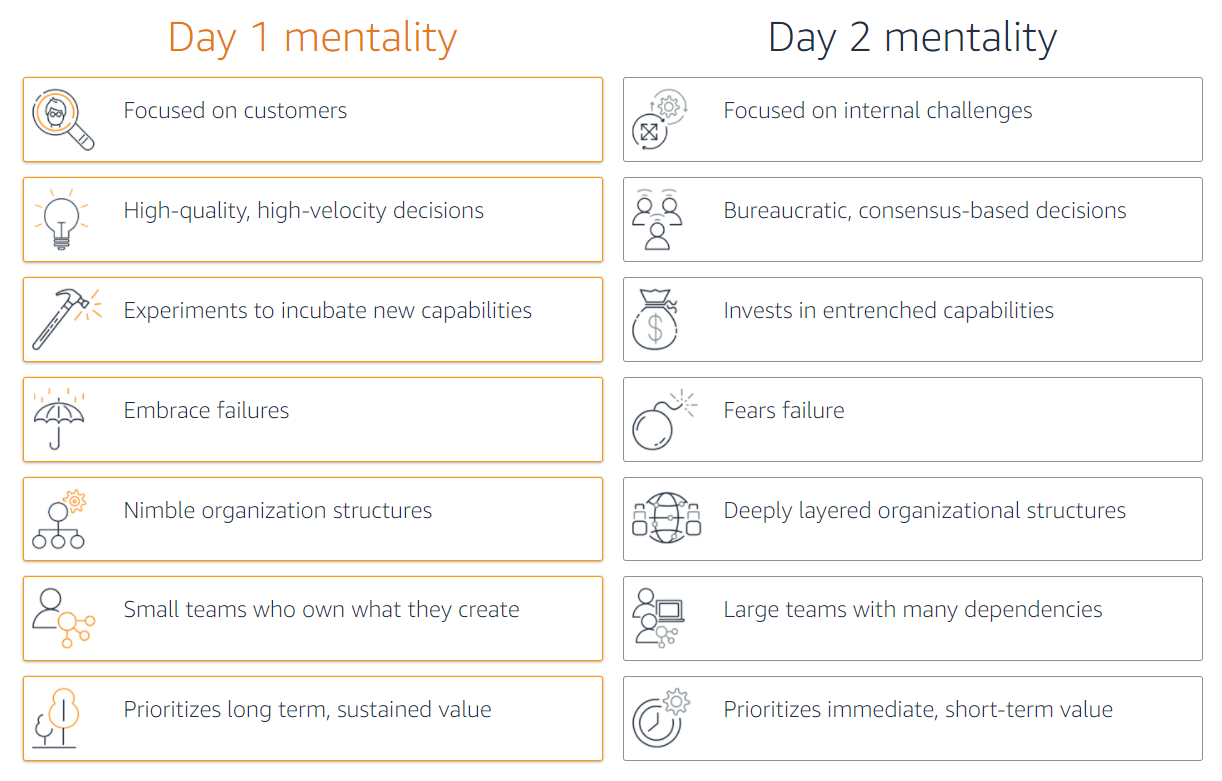
Based on these descriptions, Blue Origin is reliving one of these days repeatedly--without appearing to learn from each previous day.
Amazon’s ambition is always to embrace Day 1, and to be clear, Bezos was a big promoter of these values. So much so that these Day 1 characteristics are a part of Amazon’s workplace culture. Frankly, a Day 1 company sounds like it might be a fun and fulfilling place. It may be that a few of those characteristics have contributed to Amazon’s growth.
In later Amazon annual shareholder letters (such as this one from 2016), Bezos provides a few “essentials” for Day 1 activity in Amazon: “customer obsession, a skeptical view of proxies, the eager adoption of external trends, and high-velocity decision making.” Paraphrasing the essentials definitions one-by-one:
Customer obsession: The customer is always dissatisfied (and may not know they are), which means there’s an opportunity for Amazon’s team to “invent on their behalf.”
Resist proxies: The processes and other mechanisms used to serve products and services to customers aren’t the point. The products and services are the point.
Embrace external trends: Don’t fight powerful trends. Instead, recognize them for what they are--opportunities to be seized.
High-velocity decision-making: Make the most informed decision possible quickly. If you don’t, some other company will.
Bezos promoted these essentials and the Day 1 culture that enabled them. But did he actually believe in them or did he only push them as filler to inspire shareholders? Because if he believed the former (I think he did), then why not apply that successful and aggressive formula to Blue Origin? Because it’s obvious he didn’t...which brings us to Day 2.
Day 2’s Rise?
Imagine if Amazon decided that its potential customers were wrong not to buy an Amazon Choice product, listed all the reasons those potential customers were wrong in not selecting the company, sent that list to them, and then sued them. Amazon wouldn’t last very long. Yet, that list of activities is exactly what Blue Origin is doing as it sues the one customer who is willing to put up with its foot-dragging--NASA.
With possibly the exception of the JEDI contract, Amazon’s culture likely makes it difficult for its managers and employees to take the entitled view that Blue Origin is taking. That’s a good thing because then the company does what it can to earn its customers’ loyalty and dollars. Amazon tries many alternatives--better-made products, better value products, more services, increased convenience, etc. to win that loyalty.
We see this in services like Prime, where it seems like the company adds extras nearly every day. If it doesn’t do this, then other motivated competitors will. I think a few of us believed that Blue Origin would adopt the Day 1 culture driving Amazon’s success. It’s not too crazy a thought considering both have the same founder.
However, that list of Amazon-based essentials seems so different from how Blue Origin operates. Remember, Blue Origin’s motto is “Gradatim Ferociter”--Step-by-step, ferociously. In Bezos’ introduction of New Glenn, he provided the following of what that motto means:
“We believe "slow is smooth and smooth is fast." In the long run, deliberate and methodical wins the day, and you do things quickest by never skipping steps. This step-by-step approach is a powerful enabler of boldness and a critical ingredient in achieving the audacious.”
I agree that steps can be done deliberately and quickly (that is, after all, how nuclear launch checklists are processed). But Blue Origin’s motto and Bezos’ description of it seem to be conflating a proxy--the methodical process of building a rocket (or in this case a rocket and a lander)--with the product and service (i.e., launching rocket payloads). And doesn’t hewing to that proxy send a wrong cultural message--that high-velocity decision-making is not desired? There are plenty of legacy space companies already promoting that glacial cultural message.
As previously analyzed, Blue Origin seems to be following the very risk-averse, extremely well-established footsteps of legacy space companies. And those footsteps leave no room for the Day 1 culture Amazon embraces. Blue Origin’s suit against NASA confirms the company is well into mid-day of Day 2. It has large teams with many dependencies (look at its BE-4 engine challenges). It seems to have been focusing for many years, including this one, on internal issues. It’s prioritizing immediate, short-term value (the NASA contract). Nearly every box is checked on that Day 2 list.
With Blue Origin, we get to witness aggressiveness, but without the dynamism or even intelligence. Bezos’ attempted what appears as bribing NASA, and when that didn’t work, he resorted to using the law to force NASA to take the bribe. Perhaps Bezos might view that as a type of customer obsession, but the more emotionally balanced might have a less appreciative view.
Blue Origin is undoubtedly not the dynamic and competitive company that Amazon is, which is a shame. Bezos had implemented a philosophy for growing and running a company--Amazon. That implementation worked astonishingly well and why he didn’t adapt the philosophy to his rocket company is disappointing and puzzling. Legal coercion of a customer to use a product or service is not creating an opportunity for Blue Origin to invent on the customer’s behalf. Instead, it’s shoving a not-readymade solution down that customer’s (NASA’s) throat.
If I were NASA, my Amazon review of Blue Origin would be something like:

Blue Origin discounted $2 billion off the price for writing this review.
What can we say about Blue Origin that hasn’t already been said about Jar Jar Binks, the Spanish Inquisition, and tapeworm? We’ve been able to go to the moon for a while, and then New Glenn showed up on our doorstep. Oh, wait, that was Starship...New Glenn wasn’t in inventory. Anyway, our way of doing business changed utterly, thanks to Blue Origin (and Congress). It took the company years to send us our order, and when we got it, the pictures on the company’s website didn’t match what it sent. It may have delivered New Shepard instead.
We’ll be keeping it. Maybe we’ll paint it pink.
Zero stars, would not recommend.
COVID Infection Rate Impacts U.S. Launch Schedules?
Apparently, there are so many COVID patients in U.S. hospitals right now that liquid oxygen is in short supply. Guess what bit of space infrastructure uses liquid oxygen--typically tons of it in minutes? If you guessed rockets, you get no reward except for knowing you are very smart--just like your parents told you. Gwynne Shotwell of SpaceX mentioned a possibility of the company’s launch schedule being impacted by this strange but sadly predictable situation.
This one hits close to home, because Florida 1) hosts several launch sites for major launch services, 2) is an excellent example of state government surrendering to a virulent pandemic, resulting in 3) many COVID patients in hospitals requiring oxygen (hovering around 17,000 for the last five or so days), who compete with 4) cities/counties using liquid oxygen for drinking water treatment.
Nearly a week ago, Orlando notified its citizens that it was implementing water restrictions. Just yesterday, a neighboring county to our area notified residents living in its southern areas that their water would be treated differently, again because of liquid oxygen shortages. I don’t know how many other cities or counties in Florida will be implementing similar restrictions, but based on increased record-breaking daily infection rates (over 26,000 yesterday), this is sure to spread until suppliers can catch up.
If community water supplies are being impacted by this undersupply of liquid oxygen, then perhaps SpaceX and others are understating the impacts to their plans ?
There’s nothing good about any part of this story. Just be safe!


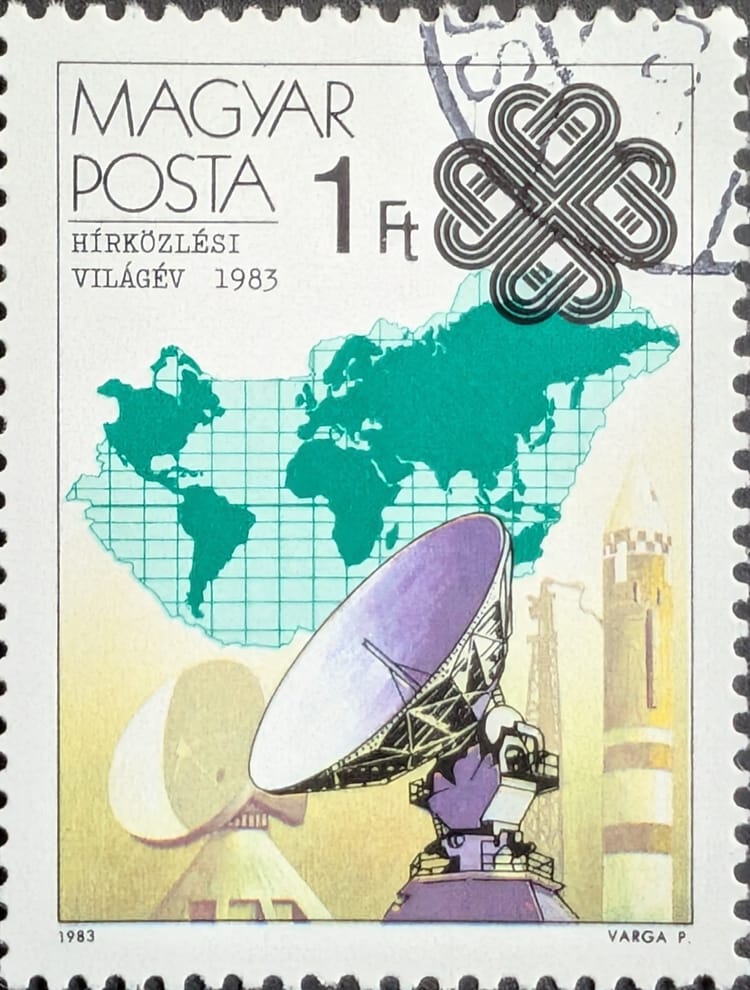
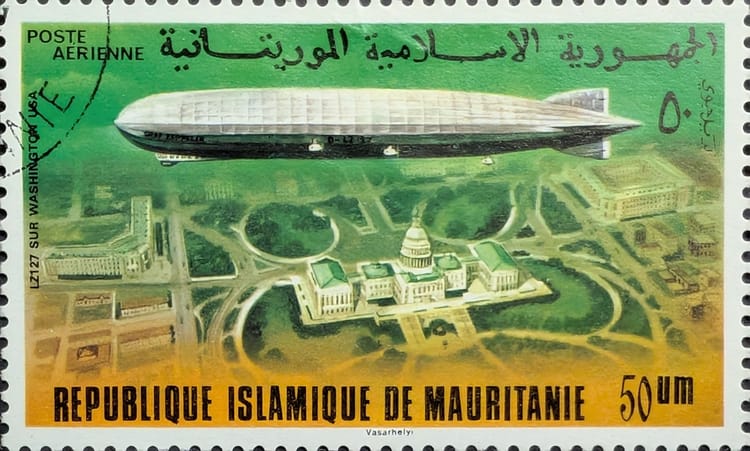
Comments ()